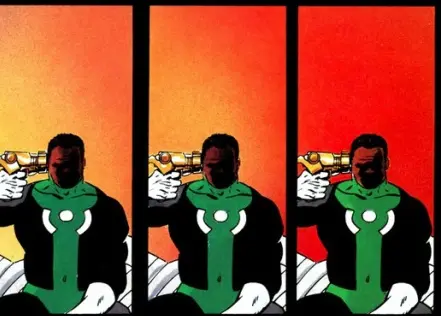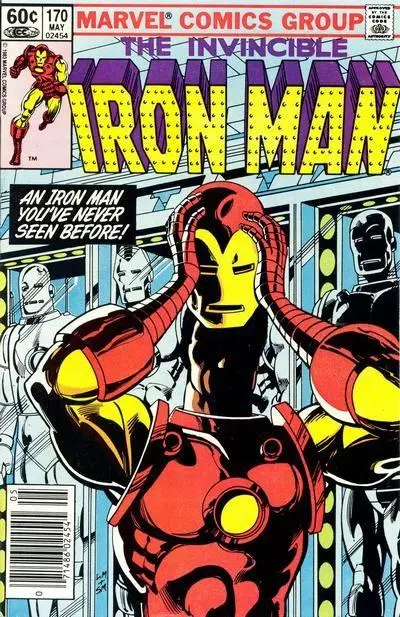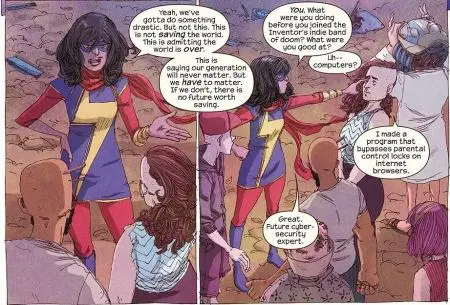Look at this. The image above these words is the cover to Ms. Marvel #007. Selfies with Wolverine. Ridiculous.
I'm old. I don't want to see teens anywhere, but there are two places I ESPECIALLY don't want to see them: on my lawn and in my comics. They're screwing up both. And it seems like there are so many teen heroes now.
Kamala Khan, new Ms. Marvel, is in high school.
Miles Morales, new Ultimate Spider-Man, was 13 when he started showing up in comics.
Riri Williams, the new Iron Man, is 15.
Nova is almost too young to be called a tween.
The world of comics is brimming with teen superheroes. And although Marvel and DC NEVER read my letters, as evidenced by the fact that Lobo The Duck was not made into a regular series, I hope that someone out there will read these words and stop with all the damn teen superheroes already.
Teenage Superheroes Don't Do What They're Meant To
How did this whole teen superhero thing start?
To find out, let's go back to the late 1930's. The U.S. was on the brink of war, people were drinking something called an egg cream, which sounds super gross. And Batman was fighting crime alone.
It's hard to imagine Batman without Robin. It's like imagining Captain America without his shield. Wait, maybe that's a bad example. Although I would enjoy a version of Batman that used Robin mostly as a human shield and occasional projectile.
But it's true. Batman once existed without Robin. In fact, Batman was caped crusading for about a year before it was decided that he needed a younger sidekick to "make [him] a more accessible character to kids and grow young readers." That's how we got Robin, the teen sidekick with a heart of gold and the smoothest legs in the biz. Seriously, that guy could have made a mint endorsing razors.
And it worked. Robin hit the scene in 1940, and sales went up. Bucky was introduced in 1941, Superboy in 1945. Things just kept rolling from there, and before long, you couldn't throw an America-branded shield without it smashing into a superhero too young to drive.
Here's my question: Are young heroes attracting young readers today? It's not like everything we did in the 1940's works now. Looking at you, Germany.
In all seriousness, you would think with the increase in teen heroes, we'd see an increase in teen readership, right?
Well, in a study conducted this year, readers under the age of 17 accounted for only 5% of comics readers (granted, this study was conducted via Facebook, which definitely muddies the waters). A similar study conducted by DC comics a couple years ago found that fans under 18 accounted for about 14% of their buyers. The highest number I could find for buyers 18 and under was around 20%, so it's probably fair to say that teenage buyers make up something like 15% of the market.
Those numbers seem pretty weak. And I think I can tell you why.
The Philosophy Behind Teen Heroes Is Bunk
Alright, fine, there may have been an increase in teen readership in the 1940's. However, as much as we might want to attribute this to Robin's gams, it's the post-war era of the 1950's that really saw the birth of the American teenager. This is when businesses started to respect and seek the purchasing power of the American teen. There's a good chance that the increase in teen readership was more a result of the increase in dollars in the pockets of teen readers, or perhaps the fact that teens were hardly considered a demographic previously.
The numbers are as questionable as Power Girl's boob window, but I think the philosophy guiding the creation of teen heroes might be even worse.
Here's the philosophy behind putting so many teens in capes:
"Teens want to see an aspirational character, but in order for a character to be aspirational, they need to be of a similar age."
In other words, Batman wouldn't be aspirational for me, as a teen, because he's an adult. Does that seem dumb to anyone else?
The mistakes here are assuming that teens:
A: Do not see themselves as adults.
B: Would say to themselves, "You know, I would like to be like Batman, but my age. And with the shortest of short pants. And I'd smile more. Someone who is just generally less cool."
Now, here's my question: Is there a teen on the planet who would prefer to be Robin as opposed to Batman? Superboy as opposed to Superman? Is there a teen who aspires to be Bucky as opposed to Captain America?
I don't think so.
These Teenagers Aren't Real Teenagers
Let's move away from the business-based reasons teen heroes are dumb and move into the more narrative reasons they're dumb. Or really smart. Too smart, even.
Riri Williams, the new Iron Man, is 15. And she's attending MIT. And she rebuilt an Iron Man suit from scratch. When I was 14, I built a "robot" out of my dad's old beer cans and hot glue. And I wrecked a pair of his prescription sunglasses, popped the lenses out to make eyes.
Peter Parker, same deal. He developed web shooters and a web formula as a teen, and he's a science genius. I developed a web fluid of sorts in my teens, and let's just not talk about it anymore.
If teen heroes aren't science geniuses, they're something else. They're morally perfect (Peter Parker and Miles Morales). They're witty as hell (Kamala Khan). They're athletically uber-talented (Robin). They are ALWAYS good-looking. Always. When I was a teenager, I looked like a C.H.U.D. but greasier.
These are not real teens. They're not. They're not even real people. I'm going to just say it, teens have flaws. About 40% of those flaws are related to leaving empty bags of Flamin' Hot Cheetos everywhere. I work in a building used by teens quite a bit. Trust me on this one.
Comics definitely require suspension of disbelief, but living in a world where all teens are so perfect, that's too far for me. I'm apt to believe in a world where men have claws made of a fictional metal, but a world of perfect teens is too far-fetched and, frankly, kind of boring.
There's No Wrong Choice
Part of the deal with superheroism is the increase in power also comes with a mandate to use that power responsibly. If only there were some shorter way to say that. Maybe uttered by an old man who got carjacked.
As readers, we kind of expect adult superheroes to behave responsibly, and a lot of compelling stories come out of the fact that adults don't always behave like adults.
2 prime examples:
Green Lantern John Stewart kind of screwed up and kind of blew up an entire populated planet. It was his mistake. And it was a tough one to deal with. Things got a little...out of hand.

This was a defining moment for Stewart. It was a monumental screw-up, but has long been the impetus that pushed him to be a great Green Lantern.
Second example, Tony Stark's life fell apart, he became a drunk, and that's when Jim Rhodes stepped in and took over.

You chumps paid like $4 to see Sam Wilson take over for Captain America, meanwhile you could have paid 60 cents to see Jim Rhodes as Iron Man. Suckers.
Tony Stark was an adult who should have known better. John Stewart was an adult who should have known better. But they were flawed human beings. It's what made them interesting. Even with all of their power, they still had some shit to get together.
The issue I have with teenage superheroes, if they did these same sorts of things, are they flawed, or are they simply teenagers? If a teenager made a bad call like John Stewart's, it's easily chalked up to "teenagers think they know everything." If a teenager got drunk and messed something up, again, "dumb teenager does something dumb" is not an electrifying headline. Being young isn't just an excuse for doing something kind of stupid. It's a legitimate reason.
The question here, what are the stakes when it comes to a 13 year-old making a bad decision? Or to put it another way, do 13 year-olds make GOOD decisions ever?
I didn't. I'm almost certain that there was not a single decision I made when I was 13 that I would defend today. I had Hanson hair and spent a lot of time doing maintenance on rollerblades.
Teen Superhero Stories Too Often Devolve Into After School Specials
I really liked most of what I read from G. Willow Wilson's Ms. Marvel. But boy did I dislike the end of the Inventor arc. *Spoilers*
Ms. Marvel is fighting The Inventor, some guy who builds evil robots. It turns out he's using real teens as living batteries to power his robots. When Kamala finds out, she confronts one of the Duracell Kidz and asks him why they do it. He says,
We're parasites, basically. Kids are, I mean.The planet is overpopulated. We're an extra generation—we shouldn't even be here. But we can do this—we can give our lives to something good.
Okay, so these kids are making a point about the environment and how their generation cares and so on. They're doing it in the stupidest possible way, but it's a noble stupidity.
Kamala then asks them about their skills and whether they might find a better use for themselves, something beyond being batteries.
![]()
image
After this, another kid says he makes stuff out of recycled materials. Basically, a bunch of teens with rad haircuts rap about the fact that their skills and contributions matter, and that pretty much wraps things up.
Okay, I can dig the occasional superhero story that doesn't end with someone's face smashed in. But I feel that, all too often, these teen heroes lend themselves to this kind of resolution, something affirmational and exhaustingly positive. A call to action telling teens that we care and your voices matter and we are totally fine with your haircuts. (We are not. Teens, I speak for the world, we are NOT fine with your haircuts. They make us feel old and frightened.)
For me, something that ends with this sort of call to action, it's not really a story. It's an essay. With pictures. Really great pictures, but not great enough to hide the stink of a "very special message" jammed into the story.
Drugs, gangs, drinking, these are things that people should talk to teens about. I'm just not totally convinced that comics are the right medium or that they've got a good track record when it comes to this stuff.
Tell you what, let's make a deal. If issues with special messages are free, paid for by the Council For People Who Think Teens Don't Already Know Drugs Are Bad or whatever, then I'll never complain about them again.
What do you guys think?

About the author
Peter Derk lives, writes, and works in Colorado. Buy him a drink and he'll talk books all day. Buy him two and he'll be happy to tell you about the horrors of being responsible for a public restroom.









